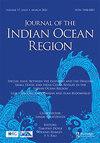India–China rivalry in the Indian Ocean: emergence of a new Indo-Maldives strategic dynamic
IF 1.3
Q2 AREA STUDIES
引用次数: 1
Abstract
ABSTRACT After India's military intervention to thwart a coup in the Maldives in 1988, India had taken for granted its strategic relationship with the Maldives since the early 1990s. However, from around mid-2000s, Sino-Maldives linkages dramatically increased, threatening the Indo-Maldives strategic relationship. Yet, as a result of the growing Sino-Indian rivalry, Indo-Maldives strategic relations have also undergone substantive changes: from India as the de facto port of first call, to articulation of an ‘India First' policy in 2005, which then underwent substantiations, especially given China's Belt and Road Initiative, towards an ‘India dominated' strategic policy since late-2018. Consequently, even though Sino-Indian competition has provided significant economic opportunities to the Maldives, and the stability of the new Indo-Maldives strategic dynamic hinges on domestic factors, overall the Maldives’ foreign policy room for manoevre has been constrained. This case suggests that while external structural factors may not determine all foreign policy choices, they nevertheless significantly constrain the behavior of small states.印度-中国在印度洋的竞争:新的印度-马尔代夫战略动态的出现
自1988年印度军事干预挫败马尔代夫政变后,印度自20世纪90年代初就将与马尔代夫的战略关系视为理所当然。然而,从2000年代中期开始,中国与马尔代夫的联系急剧增加,威胁到印度与马尔代夫的战略关系。然而,由于中印竞争日益激烈,印马战略关系也发生了实质性变化:从印度实际上是第一停靠港,到2005年阐明“印度优先”政策,然后经历了实质性的调整,特别是考虑到中国的“一带一路”倡议,到2018年底以来的“印度主导”战略政策。因此,尽管中印竞争为马尔代夫提供了重要的经济机会,而印度-马尔代夫新战略动态的稳定性取决于国内因素,但总体而言,马尔代夫的外交政策回旋余地受到了限制。这一案例表明,尽管外部结构性因素可能无法决定所有的外交政策选择,但它们在很大程度上限制了小国的行为。
本文章由计算机程序翻译,如有差异,请以英文原文为准。
求助全文
约1分钟内获得全文
求助全文

 求助内容:
求助内容: 应助结果提醒方式:
应助结果提醒方式:


